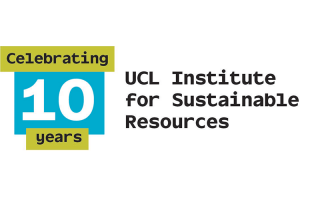Reflecting on 10 years of the UCL Institute for Sustainable Resources
6 October 2021
Reflections from UCL ISR Directors past, present and future on all that the Institute has achieved over the last 10 years.

From start-up to world-class institute
Paul Ekins
The UCL Energy Institute came first, founded in 2009 out of the Bartlett School of Graduate Studies. A substantial donation from BHP Billiton (BHPB) in 2011 then provided the opportunity (and challenge) of creating a sister institute that had a wider focus on natural resources and the environment. The UCL Institute for Sustainable Resources (ISR) was born.
A major portion of the BHPB donation was earmarked for the funding of 20 PhDs related to sustainable resource use. Students were appointed over the next couple of years and somehow arrangements were made for their adequate supervision – no small task for a new institute with few tasks. They started graduating from 2015, and the final student is submitting their thesis this year.
Two successful Masters courses have been developed: the Economics and Policy of Energy and the Environment (EPEE), which opened in 2014 and is now one of the largest Masters courses in UCL; and Sustainable Resources: Economics, Policy and Transitions a couple of years later, which is also recruiting strongly. These courses have provided the financial underpinning for the subsequent growth of ISR.
ISR’s teaching was always intended to be led by world-class research, and so it has proved, with a research programme centred on achieving the Sustainable Development Goals (SDGs) and Paris Agreement, and individual themes on sustainable, circular and resource-efficient economies, energy transitions and energy access, the water-food-land nexus, and innovation and finance for decarbonisation.
These are some of the biggest challenges facing the world today, and ISR is committed to making a significant contribution to addressing them.
Some reflections from a former BHPB Chair
Raimund Bleischwitz
Joining UCL in August 2013 as ‘BHB Billiton Chair in Sustainable Global Resources’ and Deputy Director of ISR, I was determined to shape the ISR founding partnership towards sustainability transformations. In a joint strategic decision about a ‘sweet spot’ of mutual interests, the donation was spent on setting up the institute and running a PhD programme, complemented through annual symposia addressing UCL’s Grand Challenges on sustainable cities, earth stewardship, sustainable food, and water security. Such critical mass has enabled ISR to think outside the box. ISR’s research areas were designed to be funded by other sources. Almost naturally, a new MSc programme on Sustainable Resources could evolve, which now serves as a wellspring for new talent.
The collaboration has been stretched by the ‘fossil free university’ movement arising in the UK around 2015 and by international commodity markets turning downwards, which together made an extension after the five years infeasible. It has been a productive partnership with a number of lessons learned:
- Founding partnerships for novel topics work well, if a ‘sweet spot’ of common interests can be identified (such as building up academic capacity rather than commissioning of research deliverables);
- Legacy thinking needs to be built in, as circumstances and preferences change over time; and,
- Navigating the partnership needs active communication, trust, and milestones as much as a ‘hands-off’ approach.
ISR is now established as an independent think tank with deep academic grounding – it is a unique place and a promise for future endeavours.
Celebrating 10 years of the UCL Institute for Sustainable Resources
Julia Tomei
Starting today, over the next 10 weeks we will be celebrating 10 years of the UCL Institute for Sustainable Resources (ISR). Launched under the leadership of Professor Paul Ekins in 2011, the ISR is now firmly established as a leading research institute on the sustainable use of global natural resources.
Over the past six months, I have had the pleasure of leading the institute while we seek a successor to Prof. Ekins, who reminas active in ISR in both teaching and research. I am pleased to announce that from the 1st November, I will hand over to the new Director of the ISR, Professor Jim Watson. Prof. Watson’s extensive experience of leading large, interdisciplinary research centres, engaging with diverse audiences, and strong policy impact, means we will continue to go from strength to strength.
This has been a challenging period for all of us as we seek to adapt to new ways of working following the COVID-19 pandemic. It has also been an exciting one as momentum grows behind a just transition to net zero. Improving resource governance is a vital component of this, helping us to avert climate catastrophe while restoring our natural environments and enhancing human rights. Not only will this transition require transformations in every aspect of our societies and economies, but the urgency means action is needed today. The ISR, with its inherently interdisciplinary approach and deep expertise on diverse aspects of resource use, is uniquely positioned to inform and influence how this transition occurs. The ISR has much to look forward to as we set out on making our second decade even more memorable and impactful than the first!
UCL Institute for Sustainable Resources: The Future
Jim Watson
Global resource challenges have become even more urgent since ISR was founded 10 years ago. The continuing dominance of fossil fuels in energy systems and the impacts on the climate stands out. The extreme heat and flooding that has been experienced in many regions in 2021 reinforce the urgent messages from the IPCC’s sixth assessment report. At the same time as tackling climate change, the Sustainable Development Goals highlight a host of other areas where access to resources is neither equitable nor sustainable.
ISR’s expertise is likely to remain in high demand from governments, companies, communities and citizens. But the nature of global resource challenges will continue to change. So ISR will need to adapt, and anticipate where new research, expertise and skills will be required. Three recent successes illustrate some of the agendas that will be important in future.
First, we have expanded our research on energy, resources and development in collaboration with partners in low- and middle-income countries. Despite unwelcome cuts to UK budgets, we are working with UCL colleagues and our partners to develop strategies and plans that integrate climate action, sustainable resource use and economic development.
Second, we are helping to develop the international evidence base on greenhouse gas removal methods to inform decision-making. These methods, whether nature-based or technological, are widely agreed to be essential if the UK and other countries are to reach net-zero greenhouse gas emissions. But they are fraught with technical, environmental, economic and other risks. So it is important that implementation is evidence-based and subject to rigorous evaluation.
Third, ISR researchers are involved in two national research centres on the circular economy. New economic models that use materials and other resources more efficiently and wisely are urgently needed. Our research in this area fits with ISR’s tradition of interdisciplinarity that combines economic rigour with the imperative for environmental sustainability.
 Close
Close


